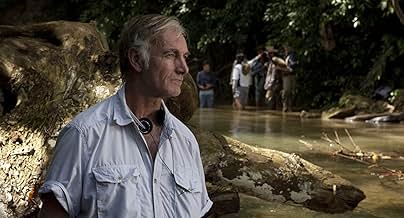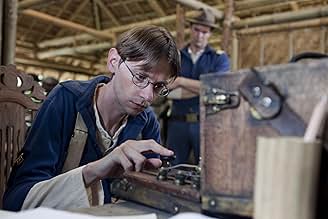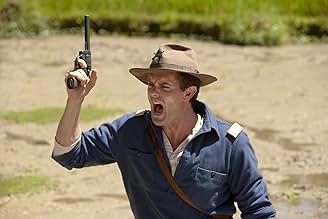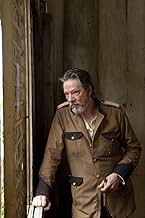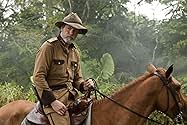Die Philippinen, um 1900. Als amerikanische Truppen die Inseln besetzen, zwingt ein US-Offizier den Dorfbürgermeister Rafael, ihm bei der Jagd auf Guerilleros zu helfen. Doch die Guerilleros... Alles lesenDie Philippinen, um 1900. Als amerikanische Truppen die Inseln besetzen, zwingt ein US-Offizier den Dorfbürgermeister Rafael, ihm bei der Jagd auf Guerilleros zu helfen. Doch die Guerilleros werden von Rafaels Bruder angeführt.Die Philippinen, um 1900. Als amerikanische Truppen die Inseln besetzen, zwingt ein US-Offizier den Dorfbürgermeister Rafael, ihm bei der Jagd auf Guerilleros zu helfen. Doch die Guerilleros werden von Rafaels Bruder angeführt.
- Auszeichnungen
- 1 Gewinn & 9 Nominierungen insgesamt
Hoffman Cheng
- Chop-Chop
- (as Sai Ho Cheng)
Reymart Colestines
- Malpulgas
- (as Raymart Colestines)
Miguel Faustmann
- Captan Narvaez
- (as Miguel Faustman)
Handlung
WUSSTEST DU SCHON:
- WissenswertesBefore Amigo, the last movie about American forces in the Philippines was John Dahl-directed The Great Raid - Tag der Befreiung (2005) which tackled World War II in the Philippines. Also in that movie was Bembol Roco who also appears in Amigo. Also in The Great Raid - Tag der Befreiung (2005) was Cesar Montano who, just like Joel Torre, also plays Jose Rizal in José Rizal (1998).
- VerbindungenFeatured in Bottomline: John Sayles (2011)
- SoundtracksKundiman of 1896 (Jocelynang Baliwag)
Traditional
Arranged and performed by Raul Manikan
Daring Music/Administered by Universal Music Corp./ASCAP
Ausgewählte Rezension
October 26, 2011 director John Sayles came to Trinity's Cinestudio for a showing of his recent movie Amigo, a story of American military occupation in the Philippines following the Spanish-American War. It's Sayles' first digital "film," a mode he said we may as well get used to, simply because it's so much cheaper than film and so will take over not just independent cinema but Hollywood as well. What he got on the screen was very nice to watch. I'd not have known it was digital, great color and some superb photography. That may partly be due to Cinestudio's wonderful facility and care with whatever it shows.
Sayles sounds like a Rhodes scholar, obviously very intelligent, but what really struck me is how much he has to say. He's engaged, he cares, he's interested, curious and thoughtful. He clearly did a lot of research on his subject and wanted to share his views.
Though I've liked some of Sayles' movies, Return of the Secaucus Seven especially, I found Amigo, unfortunately, disappointing. It doesn't come together well as drama, as a story. It seems wooden, mechanical. I also thought it was a bit hard on the ugly American, though not by much. I did disagree with Sayles when he dismissed TR for his view that it would take 100 years to civilize the Filipinos. TR was actually ahead of most Americans of his day in overcoming the racism that had infected the Western world and was then reaching a peak. And TR's prediction wasn't entirely unfair, as it was nearly a century before the Filipinos got a real chance to shape their own destiny after getting rid of Marcos. I think a good case can be made that the U.S. accelerated more than it retarded that trajectory, even with the faults of our occupation.
When one post-film questioner said he thought the Americans were portrayed unjustifiably and unnecessarily negatively, Sayles calmly defended his presentation but the rest of the Trinity audience, mostly people over 40, groaned in displeasure with the questioner's political incorrectness. So much for academic freedom.
I like to go up to movie directors after such post-film discussions to ask a question or two. Quite a few others were gathered around him, so I waited until everyone else had moved on. It was getting late and Sayles was making his way to leave but he was entirely gracious when I asked him whether he had acted in movies other than his own. He seemed happy to have the question and said something like, "Oh yes, from time to time, when there's something." And he volunteered that he usually played a bad guy, a brute or dumb in his own films. I forget his words, something like "a cop," I think he said. That made me recall his role in his own film, Brother from Another Planet. He also said he doesn't like to play characters "with an arc" when he's directing, because it becomes difficult to direct and follow the arc at the same time. So the cop roles and the like are okay in his own films. "So you're always looking around, interested in landing parts?" I asked, and he responded affirmatively, almost as if he was wondering if I had a part to offer him. I thanked him for coming to Hartford and took off. Phil Steele
A week later, quite a coincidence. I viewed Spike Lee's Malcolm X again (and liked it even better than I did when it came out). Trying to identify the actor playing the FBI surveillance agent who delivers the line, "Compared to King this guy's a monk," I came to IMDb, of course, and it turns out it's John Sayles! Sayles says the line to his co-FBI eavesdropper, whose laughing as he overhears the conversation of Malcolm X and his wife, is very likely unhistorical and over the top. But for the most part Lee has made a great movie.
Sayles sounds like a Rhodes scholar, obviously very intelligent, but what really struck me is how much he has to say. He's engaged, he cares, he's interested, curious and thoughtful. He clearly did a lot of research on his subject and wanted to share his views.
Though I've liked some of Sayles' movies, Return of the Secaucus Seven especially, I found Amigo, unfortunately, disappointing. It doesn't come together well as drama, as a story. It seems wooden, mechanical. I also thought it was a bit hard on the ugly American, though not by much. I did disagree with Sayles when he dismissed TR for his view that it would take 100 years to civilize the Filipinos. TR was actually ahead of most Americans of his day in overcoming the racism that had infected the Western world and was then reaching a peak. And TR's prediction wasn't entirely unfair, as it was nearly a century before the Filipinos got a real chance to shape their own destiny after getting rid of Marcos. I think a good case can be made that the U.S. accelerated more than it retarded that trajectory, even with the faults of our occupation.
When one post-film questioner said he thought the Americans were portrayed unjustifiably and unnecessarily negatively, Sayles calmly defended his presentation but the rest of the Trinity audience, mostly people over 40, groaned in displeasure with the questioner's political incorrectness. So much for academic freedom.
I like to go up to movie directors after such post-film discussions to ask a question or two. Quite a few others were gathered around him, so I waited until everyone else had moved on. It was getting late and Sayles was making his way to leave but he was entirely gracious when I asked him whether he had acted in movies other than his own. He seemed happy to have the question and said something like, "Oh yes, from time to time, when there's something." And he volunteered that he usually played a bad guy, a brute or dumb in his own films. I forget his words, something like "a cop," I think he said. That made me recall his role in his own film, Brother from Another Planet. He also said he doesn't like to play characters "with an arc" when he's directing, because it becomes difficult to direct and follow the arc at the same time. So the cop roles and the like are okay in his own films. "So you're always looking around, interested in landing parts?" I asked, and he responded affirmatively, almost as if he was wondering if I had a part to offer him. I thanked him for coming to Hartford and took off. Phil Steele
A week later, quite a coincidence. I viewed Spike Lee's Malcolm X again (and liked it even better than I did when it came out). Trying to identify the actor playing the FBI surveillance agent who delivers the line, "Compared to King this guy's a monk," I came to IMDb, of course, and it turns out it's John Sayles! Sayles says the line to his co-FBI eavesdropper, whose laughing as he overhears the conversation of Malcolm X and his wife, is very likely unhistorical and over the top. But for the most part Lee has made a great movie.
- steele-linden
- 3. Nov. 2011
- Permalink
Top-Auswahl
Melde dich zum Bewerten an und greife auf die Watchlist für personalisierte Empfehlungen zu.
- How long is Amigo?Powered by Alexa
Details
- Erscheinungsdatum
- Herkunftsländer
- Offizielle Standorte
- Sprachen
- Auch bekannt als
- Baryo
- Drehorte
- Produktionsfirmen
- Weitere beteiligte Unternehmen bei IMDbPro anzeigen
Box Office
- Budget
- 1.500.000 $ (geschätzt)
- Bruttoertrag in den USA und Kanada
- 184.705 $
- Eröffnungswochenende in den USA und in Kanada
- 37.324 $
- 21. Aug. 2011
- Weltweiter Bruttoertrag
- 184.705 $
- Laufzeit2 Stunden 4 Minuten
- Farbe
Zu dieser Seite beitragen
Bearbeitung vorschlagen oder fehlenden Inhalt hinzufügen



